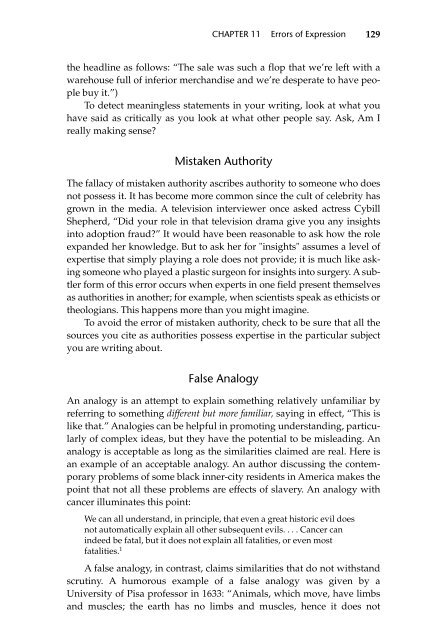Beyond Feelings
Beyond Feelings
Beyond Feelings
You also want an ePaper? Increase the reach of your titles
YUMPU automatically turns print PDFs into web optimized ePapers that Google loves.
CHAPTER 11 Errors of Expression<br />
129<br />
the headline as follows: “The sale was such a flop that we’re left with a<br />
warehouse full of inferior merchandise and we’re desperate to have people<br />
buy it.”)<br />
To detect meaningless statements in your writing, look at what you<br />
have said as critically as you look at what other people say. Ask, Am I<br />
really making sense?<br />
Mistaken Authority<br />
The fallacy of mistaken authority ascribes authority to someone who does<br />
not possess it. It has become more common since the cult of celebrity has<br />
grown in the media. A television interviewer once asked actress Cybill<br />
Shepherd, “Did your role in that television drama give you any insights<br />
into adoption fraud?” It would have been reasonable to ask how the role<br />
expanded her knowledge. But to ask her for "insights" assumes a level of<br />
expertise that simply playing a role does not provide; it is much like asking<br />
someone who played a plastic surgeon for insights into surgery. A subtler<br />
form of this error occurs when experts in one field present themselves<br />
as authorities in another; for example, when scientists speak as ethicists or<br />
theologians. This happens more than you might imagine.<br />
To avoid the error of mistaken authority, check to be sure that all the<br />
sources you cite as authorities possess expertise in the particular subject<br />
you are writing about.<br />
False Analogy<br />
An analogy is an attempt to explain something relatively unfamiliar by<br />
referring to something different but more familiar, saying in effect, “This is<br />
like that.” Analogies can be helpful in promoting understanding, particularly<br />
of complex ideas, but they have the potential to be misleading. An<br />
analogy is acceptable as long as the similarities claimed are real. Here is<br />
an example of an acceptable analogy. An author discussing the contemporary<br />
problems of some black inner-city residents in America makes the<br />
point that not all these problems are effects of slavery. An analogy with<br />
cancer illuminates this point:<br />
We can all understand, in principle, that even a great historic evil does<br />
not automatically explain all other subsequent evils. . . . Cancer can<br />
indeed be fatal, but it does not explain all fatalities, or even most<br />
fatalities. 1<br />
A false analogy, in contrast, claims similarities that do not withstand<br />
scrutiny. A humorous example of a false analogy was given by a<br />
University of Pisa professor in 1633: “Animals, which move, have limbs<br />
and muscles; the earth has no limbs and muscles, hence it does not


